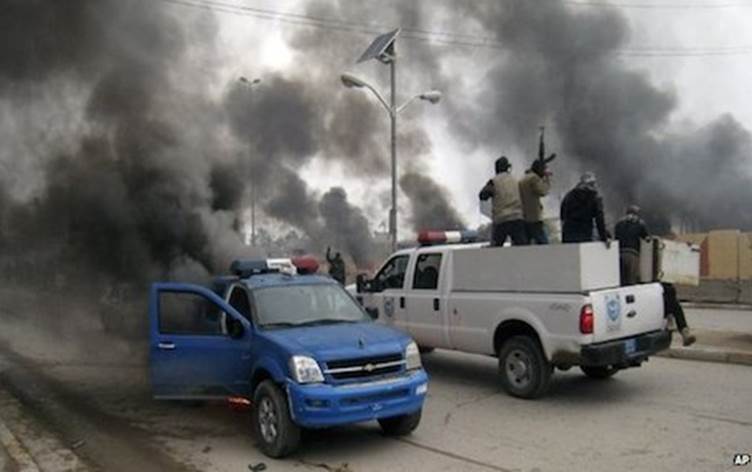ERBIL, Kurdistan Region—Dozens of Iraqi soldiers were killed on Saturday morning as fighters from the Islamic State of Iraq and Syria (ISIS) surround the city of Mosul in Northern Iraq and cut off the city from the rest of the country.
Around 70 people are reported to have been killed and 36 injured in ongoing fighting between the ISIS and Iraqi military forces in Mosul.
According to military and security sources in the province, 41 Iraqi soldiers and 27 ISIS members have been killed. More than 60 policemen are said to be among the injured.
“ISIS militants control the apartments in Yermouk district and they have forced many people to leave the area,” Yasir Hashim, the director of Mosul’s Kurdish Asayish forces told Rudaw. ”We have not received complete information as to why.”
ISIS, a radical Islamist group mainly based in Syria, has taken control of two districts in Mosul and a large number of people are fleeing the city out of fear of the spreading violence.
The group has also been engaged in fierce fighting with Iraqi troops in Anbar and Samarra.
“80 percent of routes between Mosul and Rabi’a, Tal Afar, Baghdad, and Tikrit are under the control of ISIS militants,” said Hashim.
On Saturday morning, Nineveh governor Athil al-Nujaifi called members of the provincial council for an emergency meeting to discuss the deteriorating security situation.
“We ask Kurdistan Region President Massoud Barzani to send more Peshmerga (Kurdish military) forces to protect Kurdish citizens in Mosul, especially Shabak Kurds who are under threat from militants,” Ghazwan Dawudi, a member of the provincial council, told Rudaw.
Meanwhile, Ali Muhammad Fathi, mayor of Bartella district said that Peshmerga and Zeravani Special Forces are protecting his town.
Iraqi Prime Minister Nouri al-Maliki has repeatedly called on Peshmerga forces to leave the district so that Iraqi military can take up the fight with the ISIS.
Fighting between ISIS and Iraqi forces has intensified since the beginning of this month.




Comments
Rudaw moderates all comments submitted on our website. We welcome comments which are relevant to the article and encourage further discussion about the issues that matter to you. We also welcome constructive criticism about Rudaw.
To be approved for publication, however, your comments must meet our community guidelines.
We will not tolerate the following: profanity, threats, personal attacks, vulgarity, abuse (such as sexism, racism, homophobia or xenophobia), or commercial or personal promotion.
Comments that do not meet our guidelines will be rejected. Comments are not edited – they are either approved or rejected.
Post a comment